7 start with M start with M
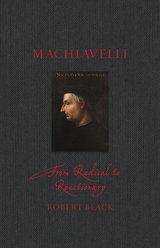
“Machiavellian” can signify duplicity and amorality in politics, but Machiavelli himself was far more complex than this cliché. A high-ranking Florentine government official and prolific writer of hugely influential political, military, and historical works, Machiavelli was also a vernacular poet, first-rank dramatist, and religious radical, rejecting not only the contemporary Catholic Church but Christianity itself. From champion of Florentine popular republicanism to political radical to conservative, Machiavelli explores the many facets of the man described as the father of modern political philosophy and political science.

One of the century’s greatest philosophers, without whom there would be no Sartre, no Foucault, no Frankfurt School, Martin Heidegger was also a man of great failures and flaws, a Faustus who made a pact with the devil of his time, Adolf Hitler. The story of Heidegger’s life and philosophy, a quintessentially German story in which good and evil, brilliance and blindness are inextricably entwined and the passions and disasters of a whole century come into play, is told in this brilliant biography.
Heidegger grew up in Catholic Germany where, for a chance at pursuing a life of learning, he pledged himself to the priesthood. Soon he turned apostate and sought a university position, which set him on the path to becoming the star of German philosophy in the 1920s. Rüdiger Safranski chronicles Heidegger’s rise along with the thought he honed on the way, with its debt to Heraclitus, Plato, and Kant, and its tragic susceptibility to the conservatism that emerged out of the nightmare of Germany’s loss in World War I. A chronicle of ideas and of personal commitments and betrayals, Safranski’s biography combines clear accounts of the philosophy that won Heidegger eternal renown with the fascinating details of the loves and lapses that tripped up this powerful intellectual.
The best intellectual biography of Heidegger ever written and a best-seller in Germany, Martin Heidegger: Between Good and Evil does not shy away from full coverage of Heidegger’s shameful transformation into a propagandist for the National Socialist regime; nor does it allow this aspect of his career to obscure his accomplishments. Written by a master of Heidegger’s philosophy, the book is one of the best introductions to the thought and to the life and times of the greatest German philosopher of the century.
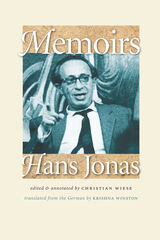
When Hans Jonas died in 1993, he was revered among American scholars specializing in European philosophy, but his thought had not yet made great inroads among a wider public. In Germany, conversely, during the 1980s, when Jonas himself was an octogenarian, he became a veritable intellectual celebrity, owing to the runaway success of his 1979 book The Imperative of Responsibility. In the 1920s, Jonas studied philosophy with Edmund Husserl and Martin Heidegger, but the Nazi regime forced him to leave Germany for London in 1933. He later emigrated to Palestine and eventually enlisted in the British Army’s Jewish Brigade to fight against Hitler. Following the Israeli War of Independence, he emigrated to the United States and took a position at the New School for Social Research in New York. He became part of a circle of friends around Hannah Arendt and Heinrich Blucher, which included Adolph Lowe and Paul Tillich.
This memoir, a diverse collection of previously unpublished materials—diaries, letters, interviews, and public statements—has been organized by Christian Wiese, whose afterword links the Jewish dimensions of Jonas’s life and philosophy. Because Jonas’s life spanned the entire twentieth century, this memoir provides nuanced pictures of German Jewry during the Weimar Republic, of German Zionism, of the Jewish emigrants in Palestine during the 1930s and 1940s, and of German Jewish émigré intellectuals in New York. Since Memoirs was first published in 2008, interest in the work of Hans Jonas has grown among American academics in recent years.

There is no better thinker than Foucault with which to begin the "Critical Lives" series. Though reticent about his personal life for most of his career, Foucault, in the last years of his life, changed his stance on the relationship between the personal and the intellectual and began to speak of an "aesthetics of existence" in which "the life" and "the work" become one. David Macey, a renowned expert on Foucault, demonstrates that these contradictions make it possible to relate Foucault's work to his life in an original and exciting way. Exploring the complex intellectual and political world in which Foucault lived and worked, and how that world is reflected in his seminal works, Macey paints a portrait of Foucault in which the thinker emerges as a brilliant strategist, one who-while fiercely promoting himself as a maverick-aligned himself with particular intellectual camps at precisely the right moments.
Michel Foucault traces the philosopher's career from his comfortable provincial
background to the pinnacle of the French academic system, paying careful attention to
the networks of friendships and the relations of power that sustained Foucault's
prominence in the academy. In an interview in 1966, Foucault said, "One ought to read
everything, study everything. In other words, one must have at one's disposal the general
archive of a period at a given moment." It is precisely this archive that Macey restores
here, accessibly relating Foucault's works to the particular context in which they were
given form.
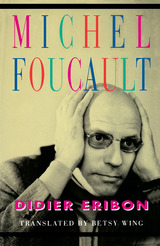
At the time of his death in 1984, at the age of fifty-eight, Michel Foucault was widely regarded as one of the most powerful minds of this century. Hailed by distinguished historians and lionized on his frequent visits to America, he continues to provoke lively debate. The nature and merits of his accomplishments remain tangled in controversy. Rejecting traditional liberal and Marxist "dreams of solidarity," Foucault became the very model of the modern intellectual, replacing Sartre as the figure of the eminent Parisian and cosmopolitan master thinker.
Foucault himself discouraged biographical questions, claiming that he was "not at all interesting." Didier Eribon's captivating account overthrows that assertion. As a journalist well acquainted with Foucault for years before his death, Eribon was particularly well placed to conduct the dozens of interviews which are the cornerstone of this book. He has drawn upon eyewitness accounts by Foucault's closest associates from all phases of his life--his mother, his schoolteachers, his classmates, his friends and enemies in academic life, and his celebrated companions in political activism, including Simone Signoret and Yves Montand. Eribon has methodically retraced the footsteps of his peripatetic subject, from France to Sweden to Poland to Germany to Tunisia to Brazil to Japan to the United States. The result is a concise, crisply readable, meticulously documented narrative that debunks the many myths and rumors surrounding the brilliant philosophe--and forces us to consider seriously the idea that all his books are indeed, just as Foucault said near the end of his life, "fragments of an autobiography."
Who was this man, Michel Foucault? In the late 1950s Foucault emerged as a budding young cultural attaché, friendly with Gaullist diplomats. By the mid-1960s he appeared as one of the avatars of structuralism, positioning himself as a new star in the fashionable world of French thought. A few months after the May 1968 student revolt, with Gaullism apparently shaken, he emerged as an ultra-leftist and a fellow traveler of Maoists. Yet during this same period, Eribon shows, he was quietly and adroitly campaigning for a chair in the College de France--the very pinnacle of the French academic system. This book does more than follow the career of one extraordinary intellectual. It reconstructs the cultural, political, and intellectual life of France from the postwar years to the present. It is the story of a man and his time.
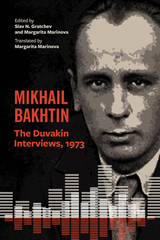
Published by Bucknell University Press. Distributed worldwide by Rutgers University Press.
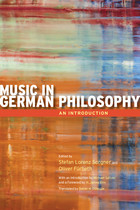
Though many well-known German philosophers have devoted considerable attention to music and its aesthetics, surprisingly few of their writings on the subject have been translated into English. Stefan Lorenz Sorgner, a philosopher, and Oliver Fürbeth, a musicologist, here fill this important gap for musical scholars and students alike with this compelling guide to the musical discourse of ten of the most important German philosophers, from Kant to Adorno.
Music in German Philosophy includes contributions from a renowned group of ten scholars, including some of today’s most prominent German thinkers, all of whom are specialists in the writers they treat. Each chapter consists of a short biographical sketch of the philosopher concerned, a summary of his writings on aesthetics, and finally a detailed exploration of his thoughts on music. The book is prefaced by the editors’ original introduction, presenting music philosophy in Germany before and after Kant, as well as a new introduction and foreword to this English-language addition, which places contemplations on music by these German philosophers within a broader intellectual climate.
READERS
Browse our collection.
PUBLISHERS
See BiblioVault's publisher services.
STUDENT SERVICES
Files for college accessibility offices.
UChicago Accessibility Resources
home | accessibility | search | about | contact us
BiblioVault ® 2001 - 2024
The University of Chicago Press









